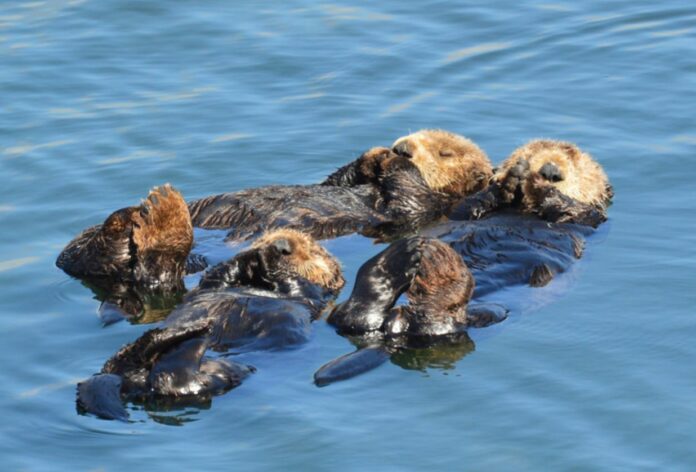Marine animals on the California coast are under threat from a rare form of Toxoplasmosis, which, if transmitted to healthy humans, can wreak havoc on the brain.
A study conducted by the California Department of Fish and Wildlife and the University of California, Davis has revealed that an uncommon strain of toxoplasmosis caused the death of four sea otters that were stranded in California.
The disease, caused by the microscopic parasite Toxoplasma gondii, is already prevalent among sea otters and can prove to be fatal. However, this newly discovered strain, which has not been observed before in aquatic animals, is particularly aggressive and can quickly kill healthy adult otters.
The researchers caution that this rare form of toxoplasmosis poses a threat to other marine wildlife and humans.
These preliminary findings have been published in the journal Frontiers in Marine Science.
As the newly discovered strain of Toxoplasma has not been previously identified on the California coast, researchers suspect it to be a recent addition. Their concern is that if this strain infects the marine environment and food chain, it could pose a risk to public health. However, no instances of infection with this strain have been reported in humans thus far.
“Because this parasite can infect humans and other animals, we want others to be aware of our findings, quickly recognize cases if they encounter them and take precautions to prevent infection,” says corresponding author Melissa Miller. “We encourage others to take extra precautions if they observe inflamed systemic fat deposits in sea otters or other marine wildlife.”
Toxoplasma gondii is a prevalent parasite that resides in both wild and domestic cats and is excreted in their feces.
Although toxoplasmosis rarely causes symptoms in healthy individuals, it can lead to miscarriages and neurological diseases.
Sea otters, in particular, are highly susceptible to Toxoplasma infection since they inhabit coastal areas where they may come into contact with the parasite’s eggs in rainwater runoff, and consume marine invertebrates that may contain concentrated parasites.
The study under discussion examined four sea otters that washed ashore between 2020 and 2022. All of them exhibited severe inflammation of their body fat, a condition known as steatitis. This is a rare occurrence in sea otters suffering from toxoplasmosis.
“The appearance of this lethal type of Toxoplasma in coastal California is concerning for two main reasons: First, because of potential population health impacts on a threatened species, and second, because this parasite could also affect the health of other animals that are susceptible to Toxoplasma infection,” adds study co-author Devinn Sinnott.
Confirmation of Toxoplasma as the cause of death for all four sea otters was established through microscopic analysis of their tissues. The parasites were found in large quantities throughout their bodies, except for the brain, which is typically one of the major organs affected in fatal toxoplasmosis cases in sea otters.
Further DNA testing revealed that all four cases were caused by a rare strain of Toxoplasma known as COUG. This strain was initially discovered in Canadian mountain lions during surveillance after a human outbreak in 1995, but the Toxoplasma strain responsible for the outbreak was never reported. The detection of COUG in sea otters is alarming and has significant implications for the health and recovery of this endangered species.
“This was a complete surprise,” remarks senior author Karen Shapiro. “The COUG genotype has never before been described in sea otters, nor anywhere in the California coastal environment or in any other aquatic mammal or bird.”
The four sea otters became stranded during periods of heavy rainfall along the coast, making it possible that they were exposed to Toxoplasma eggs through storm runoff. While three of the otters were found in close proximity to each other, it remains unclear whether they were all infected in the same area. The potential effects of this atypical strain of Toxoplasma on humans or other animals are not yet understood.
“I have studied Toxoplasma infections in sea otters for 25 years, and I have never seen such severe lesions or high parasite numbers,” Miller points out. “We are reporting our preliminary findings to alert others about this concerning condition. Since Toxoplasma can infect any warm-blooded animal, it could also potentially cause disease in animals and humans that share the same environment or food resources, including mussels, clams, oysters, and crabs that are consumed raw or undercooked.”
By enhancing surveillance efforts, it may be possible to detect the COUG strain in other animal populations.
“We still have much to learn,” adds Sinnott, highlighting, “larger-scale studies are needed to understand the potential impact of infection by the COUG Toxoplasma strain on sea otter populations, how geographically dispersed it is, how it is being introduced into the ocean and what other animals might be affected.”
Source: 10.3389/fmars.2023.1116899
Image Credit: Laird Henkel, CDFW
